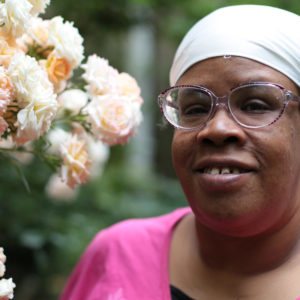 Latricia is a petite 50-year-old woman with twinkling eyes, a sweet laugh, a soft voice and incredible strength. At age 25, she was a nursing student living with her mother. When Latricia started hearing voices, her mother did her best to help. But she didn’t realize her daughter suffered from schizophrenia. As the illness worsened, normal life became impossible. Her mother, Latricia’s sole source of emotional support, moved out of state. Latricia was left behind.
Latricia is a petite 50-year-old woman with twinkling eyes, a sweet laugh, a soft voice and incredible strength. At age 25, she was a nursing student living with her mother. When Latricia started hearing voices, her mother did her best to help. But she didn’t realize her daughter suffered from schizophrenia. As the illness worsened, normal life became impossible. Her mother, Latricia’s sole source of emotional support, moved out of state. Latricia was left behind.
Tormented relentlessly by her schizophrenia, a roller coaster of medications and abusive neighbors, Latricia says, “I was devastated. Mama was my support system, and my sister took her away. Nobody wanted me. I was all by myself. I was picked on. I was sick. All the doctor did was up the medicine. More and more pills. I was a zombie. I finally decided, ‘I can’t do this anymore.’”
The next twenty years consisted of one institution and shelter after another. In between, there was life on the street. Latricia was seriously ill, utterly alone and tremendously vulnerable.
Finally, with the help of a case manager, Latricia was connected with Plymouth. When she was offered a small unit at Plymouth’s Pacific Apartments, she was eager to accept. Today, she happily praises her apartment, the psychiatrists who worked to find the right medications, and, especially, the nurturing community at Plymouth.
“We have social activities: potlucks, bingo, movie night, barbeques. At Christmas we take a cruise around Lake Washington to see the lights, Plymouth Congregational Church makes dinner, we play games, and there’s singing—lots of singing. Just like a regular Christmas.”
“The social activities are my favorite. That support helped me get stable. The psychiatrist says those who have a good support system do better at staying out of the hospital than those who don’t, and I’ve been out of the hospital over five years now. I’m proud of that.”
When asked what she would like to tell Plymouth’s supporters, Latricia’s reply is quick. “Thank you for my mental health. Because really, when I was sick, it was just terrible. And I was sick most of the time in the shelters. Plymouth gave me a second chance at life.”